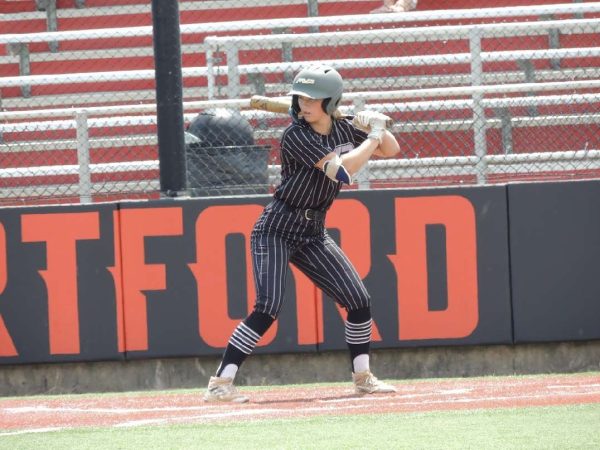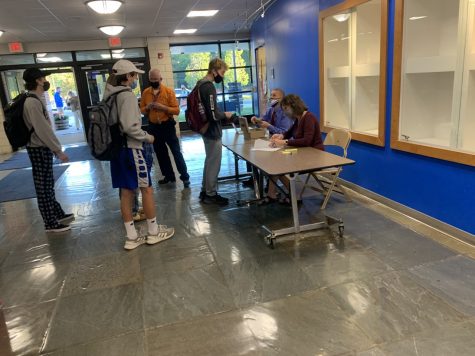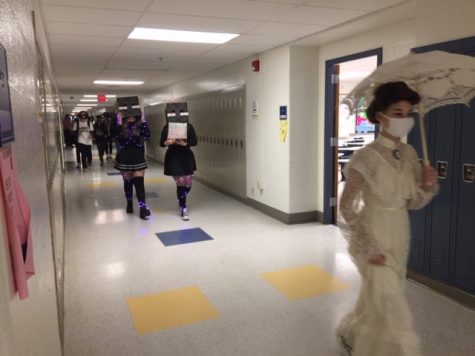The College Decision & Its Impact Upon Students
April 25, 2017
Say the word ‘college’ around a high school student and your response will be some combination of eye rolls, exasperated sighs and maybe even a scream. “Will my GPA be high enough? Will my extra-curriculars be enough? Do my teacher recommendations represent me in the best way?” These questions constantly toss and turn through seniors’ heads until the day they get their acceptance letter in the mail, or perhaps their deferral letter, or denial letter. On one random afternoon, a student will go open their mail box and immediately be hit in the face with the receival of a big envelope or a small envelope; “Congratulations,” or “We regret to inform you…”
For some students, reading “we regret to inform you” isn’t the end of the world. Take a look at senior Jack Keegan, who was rejected from his top choice school, Columbia University. Of course, he was disappointed, however “there was only a 3 percent chance [he would] get in…so it was different. I applied knowing the statistics, and my outcome didn’t surprise me.” Keegan took his denial from Columbia graciously explaining, “you don’t get mad when you don’t win the lottery, and Columbia was my lottery.”
Keegan interpreted his denial not as a failure, but as an understood, respected defeat. However, for some individuals, like JD LaBerge the reality of being denied was a difficult pill to swallow. In LaBerge’s own words, it was a “sobering defeat.” With the receival of a small letter, LaBerge was much harder on himself than Keegan. He believed that by not getting accepted to Vanderbilt University he had let many people down who were rooting for his acceptance. “I feel like my denial had repercussions further than myself. Not only did it let me down and make me feel that maybe I wasn’t good enough, but it also let down all of the moving parts and people that went into creating my application.” Within that denial, all of LaBerges time, effort, and hard work was for nothing. “My Vanderbilt denial opened my eyes to where I fit in the world…along with my acceptances I’m realizing what the right fit is, and where I will succeed.” Although difficult, LaBerge eventually swallowed the pill of denial, and moved on to other college acceptances, realizing maybe all of his efforts wasn’t actually for nothing, as he commits to Purdue University.
Not all college outcomes result in small envelopes and “We regret to inform you…” Some people, like Matt Gauthier get lucky and the first letter they receive back is their top choice school offering enrollment:
“I was overjoyed to see West Virginia accept me,” says Gauthier. “Although it wasn’t an academic success (West Virginia was not hard to get into), it was nice to see the result of my hard work. I knew what I had to do to get into West Virginia, and I successfully did that over my four years at Mills.” Acceptances instil a feeling of belonging and success in students. It is a reward for all of the time and effort you put into school over your high school career.
Most college amateurs see the acceptance process as black and white, yes you’re in, or no you’re not. However, there’s a possibility you may receive a third option, deferral. A deferral from a college is when you have applied early action, or early decision, and the college decides that they’re not going to accept nor deny you. Instead they wait to determine your fate until regular decision. This gives the school time to reevaluate your application in greater depth, and compare it to the regular decision pool (rather than early decision). The admission team then come to an agreement about about if you should truly be accepted. Senior Jacob Honig was denied from his top choice school, University of Pennsylvania. At first Honig viewed this outcome as a failure. “It was definitely a blow to my ego to say the least…my hopes were high, and then I received the letter,” he said. Quickly though, Honig turned this perceived bad news into a positive. “Before I was deferred if University of Pennsylvania had accepted me, it was a binding decision, I had no choice to go there. But now if I get in it’s not binding, I have other options to explore[sic]” Honig says, so maybe a deferral isn’t such a bad thing.
College acceptance, denials, and deferrals can either be a huge ego blow, or a huge ego boost. It’s really up to the individual person to determine how they’ll react to their letters. Joe Trahan, one of the guidance counselors at Lewis Mills, may put some students at ease with his advice. “The school you decide to go to is supposed to fit your personality, if you get denied from a school, chances are it wasn’t the right fit. Everything happens for a reason (even your denials) and it’ll all work out in the end.”







